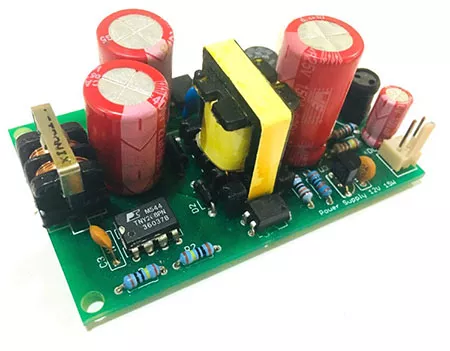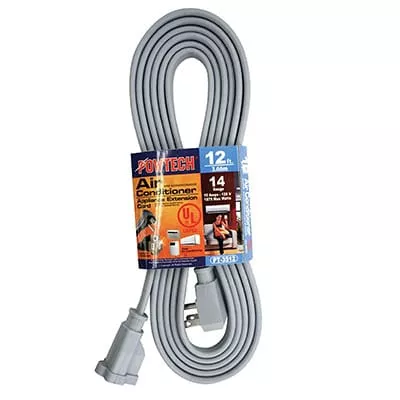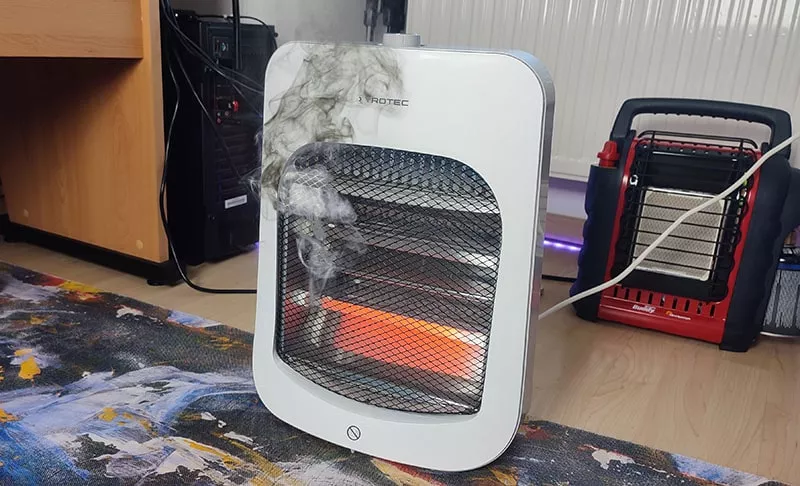Your space heater is smoking? Immediately unplug it from the wall outlet! Then, grab a tea (or whatever you like) and make yourself comfortable.
After reading this article, you will know exactly what to do about your smoking space heater. We will check whether you should get a new one, and if not, how to fix the most likely causes of your space heater smoking.
Quick answer: Space heaters usually smoke from the heating elements, the internal power electronics, the power cord, or the case. Smoking heating elements usually indicate dust. Clean them with rubbing alcohol. If smoke comes out the inside, then check the electronics for blown parts and replace them. Similarly, check your power cord for issues and replace it if necessary.
Let’s go through each of the problems step-by-step!
Should you get a new space heater?
Smoking in a space heater is not a good sign at all. Something inside or outside the space heater went wrong.
And you can’t continue running your space heater as it is, because eventually, your space heater will catch flames. Smoke is a messenger of fire.
So, should you just get a new space heater?
Whether you should get a new space heater (without trying to fix the issue) is a very psychological question. Because, even if you manage to fix your space heater (using the tips I am about to give you), it could still be that you don’t trust your space heater to run safely anymore.
So, here’s my advice:
If you are a safety-oriented person and you run your space heater indoors where you potentially risk your family’s lives and your house (which is basically your entire existence), you should get a new space heater.
My personal favorite safe space heater is this Pelonis oil-filled radiator (click here to view it on amazon).
Oil-filled radiators are very family and indoor-safe. They normally never smoke since their heating elements are embedded in oil inside their large metal case.
Their surface temperature is 180°F at most, which is too low to cause smoke or fire.
If, however, you are good at electronics, and you trust yourself to fix the smoke issue, then continue reading!
Reasons and fixes for a space heater smoking
Let’s have a look at the most common problems that cause a space heater to smoke. In addition, for each possible cause, I noted a way to test for that specific cause and how to fix it.
Dust or dirt on the heating elements
If you don’t use your space heater often, dust settles on the heater. This is oftentimes the case in places where a lot of dust settles (for example in your living space), or in wood workshops where there’s lots of sawdust in the air.
When you turn on your heater, the heating elements get hot enough to burn the sawdust, which causes the smoking.
Space heater heating elements get between 750°F and 850°F. Propane heaters get even hotter than that. So, any dust on them turns to smoke.
How to test: Wipe your finger across the space heater’s surface. Is there any dust?
You can also unmount the safety grid in front of your space heater’s heating elements and see whether the heating elements are dirty. Black stains on the heating elements are a sign of burned dust and dirt.
How to fix: Give your space heater a thorough wet wipe. If you find that some of the dirt does not come off, you can use rubbing alcohol. This gets rid of grease and oils that also cause smoking.
For hardly accessible spots you can use Q-tips with rubbing alcohol.
How to prevent it in the future: To prevent your space heater from accumulating dust and dirt in the future, you should put your space heater in a storage room when you don’t use it for a longer time.
For example, when the winter ends, you can store your space heater in a storage room until you need it again the next winter.
You should not keep your space heater in a busy place. Essentially, dust is a mix of dead skin and hair cells. So, keep your space heater away from people and pets if you don’t need it.
Blown parts in the electronic circuitry
Once, I worked in an electronics measurement devices factory where I repaired broken devices. One problem occurred over and over: When I plugged a device into the wall outlet, it started smoking.
The problems were always in the electronic circuitry. The most frequent issue is a short circuit, blown capacitors (which explode and smoke afterward), or burned resistors.
It might very well be that there is such an issue in your space heater’s electronics, which causes components to overheat and smoke. Luckily, this is easier to figure out than it sounds. Still, you need a bit of electronics skills.
How to test: Open your space heater’s case until you see electronic circuit boards.
There should be at least one circuit board with big capacitors and coils. That’s the power electronics component.
This component is the most error-prone since it converts large currents and voltages.
Visually inspect this component and see if you see any burn marks, stains, or broken pieces. Oftentimes, it takes a few minutes to find the issue.
If you don’t see an issue with the power electronics circuit board, look for another circuit board (thermostat, front panel, etc.) and check for burn marks.
After double-checking that your circuitry does not touch any conductors, you can even turn on your open space heater and see where the smoke comes from. You should, however, only do this if you are really familiar with electronics.
 An electronic power module
An electronic power module
How to fix: Most electronic circuitry issues are simple part replacements. Just identify the broken or blown part, and replace it with a matching one. You can find replacement parts online. For the replacement, you likely need a soldering iron.
After replacing the part, turn on your space heater. Now, pay attention to whether this same part blows up again. If this happens, then the issue is not the blown part itself, but another part (likely a short circuit) that causes a higher current or voltage in your replacement part.
This case is a bit harder to troubleshoot.
I suggest getting a multimeter and checking all capacitors and resistors for short circuits. Normally, capacitors and resistors should be a resistance to currents.
Check all coils (or inductances) for open circuits. Coils (inductances) should be very low resistances for currents.
How to prevent this in the future: You can’t really prevent electronic issues. The reason for electronic issues can range anywhere from aging to humidity inside the space heater.
All you can do is use your space heater properly. Store it in a dry indoor place.
Faulty power or extension cord
Maybe the smoking does not come directly from your space heater but from the power cord.
If you don’t plug the power cord firmly into the wall outlet, you unknowingly create a point of high resistance.
And high resistances always heat up. In the worst case, the power cord or extension cord starts smoking and catches fire.
Also, if you use a cheap extension cord, it might be that its rating is too low for space heaters. Space heaters draw 12.5A of current. So, your extension cord has to be rated above that. Otherwise, you risk a cable meltdown.
How to test: Turn your space heater on again. See where the smoke comes from. If it comes from the space heater end of the power cord, then the connection to the space heater is faulty.
Else, if the smoke comes from the wall-outlet, then the issue is either in the power cord, in the wall outlet, or in the connection point of both.
How to fix: If the space heater end of your power cord smokes, then you have to open your space heater and double-check that the power cord connects tightly to the power electronics. You can resolder the power cord and see if that resolves the space heater smoking.
If the smoke comes from the wall outlet, ensure that you plug in the power cord firmly. Also, you should cross-check with other heavy-duty devices whether that same wall outlet smokes. This way you can eliminate the wall outlet or the space heater as the cause.
If the space heater’s power cord is the cause, you can replace it with a new power cord.
Also, if you are using an extension cord and your extension cord is the cause, then you should get a new extension cord for space heaters.

How to prevent it in the future: The original cause of your space heater’s power cord smoking is likely that you either don’t connect it tightly to the wall outlet, or you bumped into the space heater and almost ripped off the power cord.
Overstretching of the power cord can rip a few connection strands between the space heater and the power cord and cause a high resistance, which, in turn, causes smoking.
Case material
Space heaters that are made of cheap plastic materials can start smoking after a while once the material gets hot enough.
Even cheap space heaters reach heating element surface temperatures of around 800°F. The difference between quality products and cheap products is not the heating, but the materials used and the finish.
Most plastic materials melt between 250°F to 350°F. So, in a poor-quality space heater, it is just a matter of time before the space heater starts melting down.
How to test: You can usually tell by looking at a space heater whether it’s a good quality product or not.
Most plastic space heaters are not that good. Of course, there are exceptions.
Turn on your space heater. Does it smoke immediately? If it smokes immediately, then the issue is not the case material (since it needs time to heat up). If, however, it starts smoking only after a few minutes, then it is very likely that plastic is melting somewhere.
Don’t panic and carefully check where the smoke comes from.
How to fix: You can’t really fix the material your space heater is made of. Well… technically, you can disassemble the entire heater and rebuild it with a new case of wood or metal. But that would take dedication.
Instead, I recommend getting a new quality space heater. I think material-wise, the Dr. Infrared Heater (click here to see it on amazon) is the best heater.
It is made of solid real wood (which has an ignition temperature of over 1,100°F) and is, therefore, a lot safer than plastic space heaters.
How to prevent it in the future: Only use quality space heaters. Cheap space heaters can melt and catch fire quickly.
Can you continue using a self-fixed space heater?
Ideally, you should use your smoking space heater (after you fixed it) only in places where it can’t cause greater harm.
Self-repairs are if improperly done, dangerous. They create an illusion of safety where there is none.
Also, it might be that your repair did not fix the root cause of the smoking problem.
For example, when you replace a burned part in a space heater, the burned part itself might not be the cause. It could have been the power component sending too much power to that part.
Or, if your case material melts, the root cause might not be the cheap material itself. It could also be the heating elements that get too hot because a temperature sensor is broken.
Space heaters are technically feedback loops: They heat, measure the temperature, and, based on the temperature, adjust the heat.
So, the smoking issue appears in one spot. But the root cause could be anywhere else in the heating feedback loop.
And that’s the key reason why I suggest not using this space heater in important spaces anymore. The space heater already proved that it is able to catch fire. Since there is no guarantee you fixed the root cause of the problem, continuing to use the space heater is still inherently risky.
In all cases, you should get a new indoor space heater.
You can continue using the repaired space heater in a garage or workshop. There, test your space heater for a few weeks, or months.
If it still works, this indicates that you fixed the root cause of the smoking issue and you can use your heater indoors again.
Conclusion
You can fix a smoking space heater yourself. Oftentimes, smoking is caused by dust and dirt, or an issue in the power electronics.
You can try to fix it yourself. After fixing it, use the fixed space heater only in safe places such as your garage or workshop.
Better burn down your garage or workshop than your house.
If your space heater works without problems for a few weeks, you likely fixed the root cause of the smoking.
Then you can use your heater indoors again.
